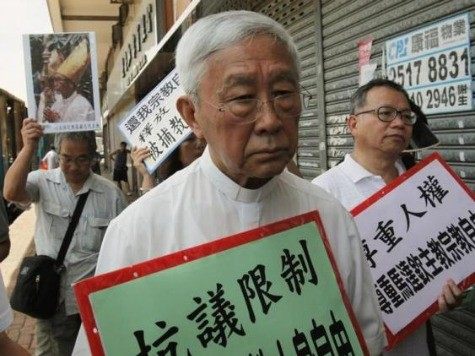Cardinal Joseph Zen has denounced China’s central government for concealing information about the fate of Cosmas Shi Enxiang, a 94-year-old underground Catholic bishop who was taken prisoner in 2001 and who is now rumored to be dead.
“The news of his death had been circulating for two weeks,” Zen said. “The government should give us an answer. Is he really dead? When and where did it happen? Will they return the remains to his family?”
The redoubtable Cardinal Joseph Zen is no stranger to confrontation with China’s communist government, and has been a thorn in Beijing’s side especially because of his pro-democracy activism. In 2006, for example, when Zen was acting bishop of Hong Kong, Chinese police went so far as to send a letter to Pope Benedict complaining about the Bishop’s support for South Korean farmers arrested during a WTO meeting.
Now, the retired Cardinal, who just turned 83, is leading protests outside the Chinese government’s liaison office in Hong Kong in an effort to obtain official confirmation of the death of Bishop Cosmas Shi. On Saturday, the Cardinal and other members of the Hong Kong diocese prayed and laid white roses outside the liaison office to commemorate clergy who have died in Chinese prisons.
Ordained a priest just two years after Mao Zedong came to power, Cosmas Shi was arrested for the first time in 1954 because of his persistent fidelity to the Pope. In 1957, he was sentenced to hard labor in the gelid region of Heilongjiang and was later transferred to the Shanxi coal mines. He was not released until 1980, after which he returned to a life of evangelization. He was secretly ordained a bishop in 1982.
Beijing seems frightened of repercussions if they confirm the death of Bishop Shi, who is something of a folk hero for Chinese Catholics. Because of his staunch fidelity to Rome and the Pope, Shi has spent more than half his life behind bars or in labor camps—a total of 54 years. When he was last arrested in 2001, he was carried off without trial, charge or official sentencing.
Now, in much of China, Shi is being mourned as a martyr and a saint. Many assume that he died from torture or starvation, as has been the fate of a number of other leaders of China’s underground Catholic Church.
Liu Difen, for example, the underground bishop of Anguo, died in prison in 1992. When his body was returned to relatives, they found scars all over his body, as well as some open wounds that still had not had time to heal.
Similarly, the elderly bishop of Baoding, Joseph Fan Xueyan, was arrested in 1992, and not long after, his corpse was dropped on the doorstep of his family’s home, wrapped in a plastic bag. The bishop’s body showed signs of torture around his neck, and he had several large bruises on his chest, forehead, and legs.
Like Shi, Bishop Fan had also spent nearly 30 years in prison for his allegiance to Rome and obstinate refusal to join the Patriotic Association. Thousands of faithful showed up for his funeral and, in spite of the numerous soldiers sent to maintain order, the faithful protested publicly, demanding an investigation into Fan’s death and the apprehension and trial of those responsible for his mistreatment.
Hebei provincial officials reportedly informed family members in January that the bishop had died, but then other officials denied knowing anything about where the bishop was or what state he was in.
Shi Chunyan, the bishop’s niece, said that the family is waiting for the bishop, “whether it be his body or ashes, to be returned to Shizhuang, our hometown, before we decide what to do next.”
Some suspect that Beijing’s reluctance to confirm Shi’s death may also stem from hesitation to mar China’s already fragile relations with the Vatican.
Follow Thomas D. Williams on Twitter @tdwilliamsrome.

COMMENTS
Please let us know if you're having issues with commenting.